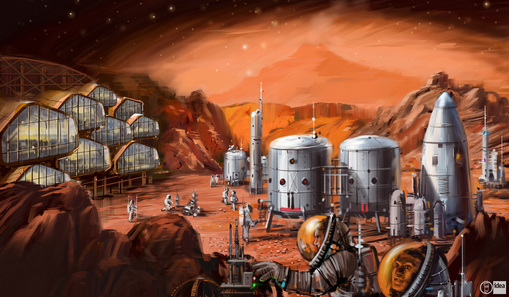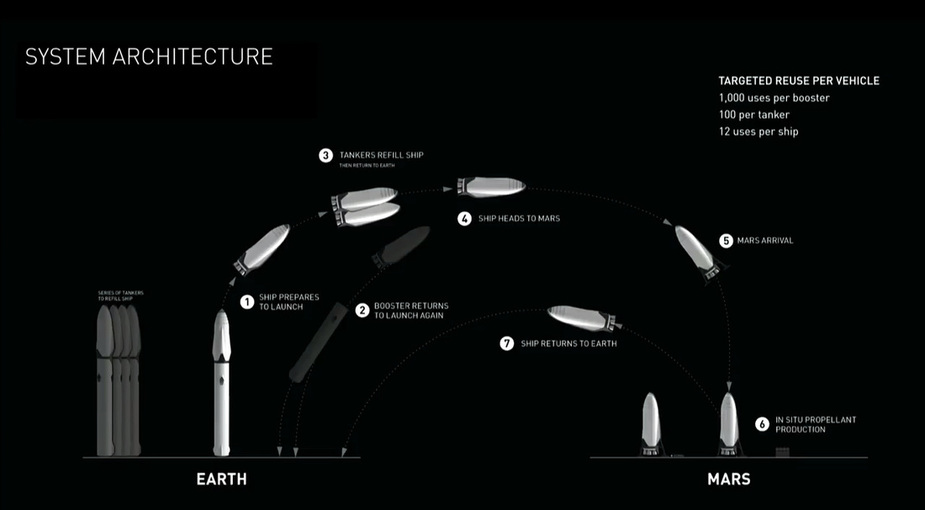|
by Stella Canessa '19  NASA plays a very important role for America’s prestige, economic prosperity and scientific development. Now that space on earth has become cozy, with 10 billion people living here by 2050, the interest in research on space colonization has grown considerably. While this novel research is a hot topic in public discussion, for various reasons the presidential candidates Hillary Clinton and Donald Trump have taken astonishingly little stand on the issue. What effect does the election of either candidate have on the development of the US space program and what would life in space look like?  Elon Musk presented this graphic at a presentation to show the details of his Interplanetary Transport System Elon Musk presented this graphic at a presentation to show the details of his Interplanetary Transport System One planet has become of special interest: Mars. The red planet’s most fascinating feature is frozen water underneath its surface, which would allow settlers to grow their own food. Food self-sufficiency would be crucial to limit expensive supply transportation from Earth to Mars. NASA scientists have used simulations to understand plant growth on Mars. Early experiments were a success: tests on lettuce showed that Martian plants would show little difference from normal plants but would just take longer to grow. But how should we get to Mars? Leading innovator Elon Musk’s business SpaceX paves the way to an affordable and commercial journey to Mars through a new three step design of spaceships. Separate boosters would launch at the same time with the passenger spaceship and recharge it during the flight, to reduce the initial weight of the passenger ship. His project envisions up to 100 people at a time travelling to Mars for ‘only’ $200,000 each. However, the four-month long trip could become much costlier than that. “Are you prepared to die?” Musk asks. The actual cost of the flight seems to be its danger and the risks of a lethal failure. While the living style on Mars is still being developed, we have a relatively clear vision of an alternative: the cloud cities of Venus. Venus’ extremely thick atmosphere is a challenge and at the same time a major benefit for colonization. While it forces human life 30 miles up in the sky, the high CO2 concentration would make any Earth-air filled spaces float like helium balloons. Temperatures at that height, gravity, and pressure are more similar to Earth’s and would make life much easier and enjoyable on Venus than on Mars. The major drawback, however, in comparison to Mars is that Venus has no water supplies and would have to stay much more dependent on Earth. Finally, how does the outcome of this year’s presidential elections affect space colonization programs? Strikingly, comments on NASA projects and budgeting have been sparse the past months in contrast to current President Obama’s bold target of enabling life on Mars by the 2030s. But even though space colonization was not at the center of presidential debate, the future for the programs seem good in either case. Trump’s fundamental economic liberal ideology will gladly support the privatization of space colonization with commercial privately owned firms such as SpaceX leading innovation. Hillary, on the other hand, already planned to reverse NASA budget cuts in her first presidential run and will likely continue her support. The most compelling explanation for the lack of political interest for the project is that it is rather long term and therefore has little effect on either candidate’s popularity in the election this Tuesday. Finally, this lack of attention might be a mistake. The potential for colonization of Mars is great, and it should be supported by the government as long as we still have enough time and space to do so. Sources: http://www.bbc.com/future/story/20161019-the-amazing-cloud-cities-we-could-build-on-venus http://www.nasa.gov/sites/default/files/atoms/files/journey-to-mars-next-steps-20151008_508.pdf http://www.bbc.com/future/story/20160928-the-astronomical-cost-of-going-to-mars-and-staying-there http://www.livescience.com/56406-martian-gardens-simulate-farming-mars.html http://gizmodo.com/the-2016-presidential-candidates-views-on-nasa-and-spac-1760875565
1 Comment
Olivia
11/24/2016 02:35:29 am
Awesome topic, Stella!
Reply
Leave a Reply. |
